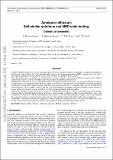Ambipolar diffusion : self-similar solutions and MHD code testing. Cylindrical symmetry
Abstract
Context. Ambipolar diffusion is a process occurring in partially ionised astrophysical systems that imparts a complicated mathematical and physical nature to Ohma's law. The numerical codes that solve the magnetohydrodynamic (MHD) equations have to be able to deal with the singularities that are naturally created in the system by the ambipolar diffusion term. Aims. The global aim is to calculate a set of theoretical self-similar solutions to the nonlinear diffusion equation with cylindrical symmetry that can be used as tests for MHD codes which include the ambipolar diffusion term. Methods. First, following the general methods developed in the applied mathematics literature, we obtained the theoretical solutions as eigenfunctions of a nonlinear ordinary differential equation. Phase-plane techniques were used to integrate through the singularities at the locations of the nulls, which correspond to infinitely sharp current sheets. In the second half of the paper, we consider the use of these solutions as tests for MHD codes. To that end, we used the Bifrost code, thereby testing the capabilities of these solutions as tests as well as (inversely) the accuracy of Bifrosta's recently developed ambipolar diffusion module. Results. The obtained solutions are shown to constitute a demanding, but nonetheless viable, test for MHD codes that incorporate ambipolar diffusion. Detailed tabulated runs of the solutions have been made available at a public repository. The Bifrost code is able to reproduce the theoretical solutions with sufficient accuracy up to very advanced diffusive times. Using the code, we also explored the asymptotic properties of our theoretical solutions in time when initially perturbed with either small or finite perturbations. Conclusions. The functions obtained in this paper are relevant as physical solutions and also as tests for general MHD codes. They provide a more stringent and general test than the simple Zeldovich-Kompaneets-Barenblatt-Pattle solution.
Citation
Moreno-Insertis , F , Nóbrega-Siverio , D , Priest , E R & Hood , A W 2022 , ' Ambipolar diffusion : self-similar solutions and MHD code testing. Cylindrical symmetry ' , Astronomy & Astrophysics , vol. 662 , A42 . https://doi.org/10.1051/0004-6361/202141449
Publication
Astronomy & Astrophysics
Status
Peer reviewed
ISSN
0004-6361Type
Journal article
Description
Funding: This research has been supported by the Spanish Ministry of Science, Innovation and Universities through projects AYA2014-55078-P and PGC2018-095832-B-I00. The authors are also grateful to the European Research Council for support through the Synergy Grant number 810218 (ERC-2018-SyG). DNS acknowledges support by the Research Council of Norway through its Centres of Excellence scheme, project number 262622, and through grants of computing time from the Programme for Supercomputing. AWH gratefully acknowledges the financial support of STFC through the Consolidated grant, ST/S000402/1, to the University of St Andrews.Collections
Items in the St Andrews Research Repository are protected by copyright, with all rights reserved, unless otherwise indicated.

